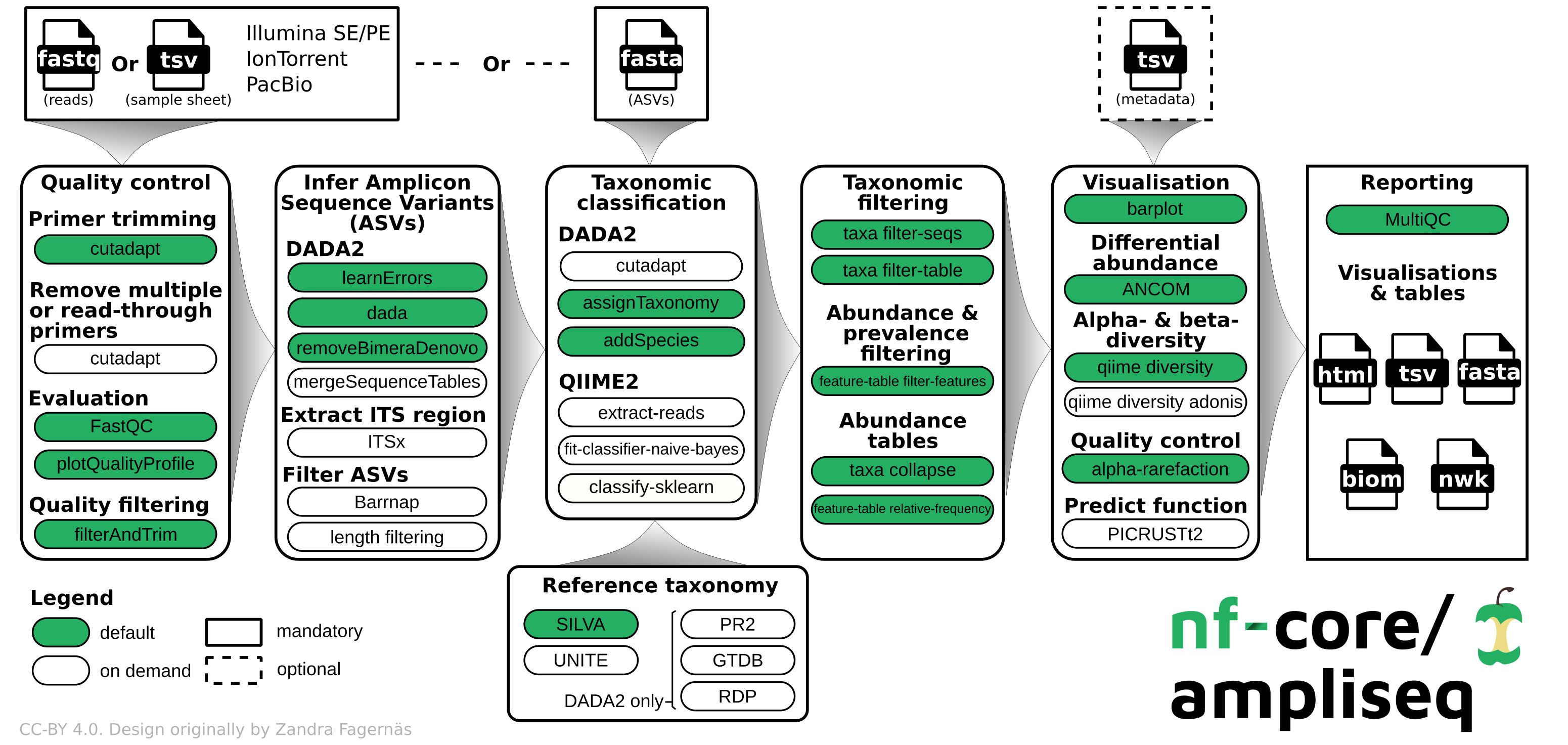nf-core/ampliseq
Amplicon sequencing analysis workflow using DADA2 and QIIME2
2.4.0). The latest
stable release is
2.15.0
.
Introduction
nfcore/ampliseq is a bioinformatics analysis pipeline used for amplicon sequencing, supporting denoising of any amplicon and, currently, taxonomic assignment of 16S, ITS and 18S amplicons. Supported is paired-end Illumina or single-end Illumina, PacBio and IonTorrent data. Default is the analysis of 16S rRNA gene amplicons sequenced paired-end with Illumina.

The pipeline is built using Nextflow, a workflow tool to run tasks across multiple compute infrastructures in a very portable manner. It uses Docker/Singularity containers making installation trivial and results highly reproducible. The Nextflow DSL2 implementation of this pipeline uses one container per process which makes it much easier to maintain and update software dependencies. Where possible, these processes have been submitted to and installed from nf-core/modules in order to make them available to all nf-core pipelines, and to everyone within the Nextflow community!
On release, automated continuous integration tests run the pipeline on a full-sized dataset on the AWS cloud infrastructure. This ensures that the pipeline runs on AWS, has sensible resource allocation defaults set to run on real-world datasets, and permits the persistent storage of results to benchmark between pipeline releases and other analysis sources. The results obtained from the full-sized test can be viewed on the nf-core website.
Pipeline summary
By default, the pipeline currently performs the following:
- Sequencing quality control (FastQC)
- Trimming of reads (Cutadapt)
- Infer Amplicon Sequence Variants (ASVs) (DADA2)
- Predict whether ASVs are ribosomal RNA sequences (Barrnap)
- Taxonomical classification using DADA2 or QIIME2
- Excludes unwanted taxa, produces absolute and relative feature/taxa count tables and plots, plots alpha rarefaction curves, computes alpha and beta diversity indices and plots thereof (QIIME2)
- Calls differentially abundant taxa (ANCOM)
- Overall pipeline run summaries (MultiQC)
Quick Start
-
Install
Nextflow(>=21.10.3) -
Install any of
Docker,Singularity(you can follow this tutorial),Podman,ShifterorCharliecloudfor full pipeline reproducibility (you can useCondaboth to install Nextflow itself and also to manage software within pipelines. Please only use it within pipelines as a last resort; see docs). -
Download the pipeline and test it on a minimal dataset with a single command:
nextflow run nf-core/ampliseq -profile test,YOURPROFILE --outdir <OUTDIR>Note that some form of configuration will be needed so that Nextflow knows how to fetch the required software. This is usually done in the form of a config profile (
YOURPROFILEin the example command above). You can chain multiple config profiles in a comma-separated string.- The pipeline comes with config profiles called
docker,singularity,podman,shifter,charliecloudandcondawhich instruct the pipeline to use the named tool for software management. For example,-profile test,docker. - Please check nf-core/configs to see if a custom config file to run nf-core pipelines already exists for your Institute. If so, you can simply use
-profile <institute>in your command. This will enable eitherdockerorsingularityand set the appropriate execution settings for your local compute environment. - If you are using
singularity, please use thenf-core downloadcommand to download images first, before running the pipeline. Setting theNXF_SINGULARITY_CACHEDIRorsingularity.cacheDirNextflow options enables you to store and re-use the images from a central location for future pipeline runs. - If you are using
conda, it is highly recommended to use theNXF_CONDA_CACHEDIRorconda.cacheDirsettings to store the environments in a central location for future pipeline runs.
- The pipeline comes with config profiles called
-
Start running your own analysis!
#16S rRNA gene amplicon analysis of Illumina paired-end data nextflow run nf-core/ampliseq -profile <docker/singularity/podman/shifter/charliecloud/conda/institute> --input "data" --FW_primer "GTGYCAGCMGCCGCGGTAA" --RV_primer "GGACTACNVGGGTWTCTAAT" --metadata "data/Metadata.tsv" --outdir <OUTDIR>
See usage docs and parameter docs for all of the available options when running the pipeline.
Documentation
The nf-core/ampliseq pipeline comes with documentation about the pipeline usage, parameters and output. A video about relevance, usage and output of the pipeline (version 2.1.0; 26th Oct. 2021) can also be found in YouTube and billibilli, the slides are deposited at figshare.
Credits
nf-core/ampliseq was originally written by Daniel Straub (@d4straub) and Alexander Peltzer (@apeltzer) for use at the Quantitative Biology Center (QBiC) and Microbial Ecology, Center for Applied Geosciences, part of Eberhard Karls Universität Tübingen (Germany). Daniel Lundin @erikrikarddaniel (Linnaeus University, Sweden) joined before pipeline release 2.0.0 and helped to improve the pipeline considerably.
We thank the following people for their extensive assistance in the development of this pipeline (in alphabetical order):
Contributions and Support
If you would like to contribute to this pipeline, please see the contributing guidelines.
For further information or help, don’t hesitate to get in touch on the Slack #ampliseq channel (you can join with this invite).
Citations
If you use nf-core/ampliseq for your analysis, please cite the ampliseq article as follows:
Daniel Straub, Nia Blackwell, Adrian Langarica-Fuentes, Alexander Peltzer, Sven Nahnsen, Sara Kleindienst Interpretations of Environmental Microbial Community Studies Are Biased by the Selected 16S rRNA (Gene) Amplicon Sequencing Pipeline Frontiers in Microbiology 2020, 11:2652 doi: 10.3389/fmicb.2020.550420.
You can cite the nf-core/ampliseq zenodo record for a specific version using the following doi: 10.5281/zenodo.1493841
An extensive list of references for the tools used by the pipeline can be found in the CITATIONS.md file.
You can cite the nf-core publication as follows:
The nf-core framework for community-curated bioinformatics pipelines.
Philip Ewels, Alexander Peltzer, Sven Fillinger, Harshil Patel, Johannes Alneberg, Andreas Wilm, Maxime Ulysse Garcia, Paolo Di Tommaso & Sven Nahnsen.
Nat Biotechnol. 2020 Feb 13. doi: 10.1038/s41587-020-0439-x.